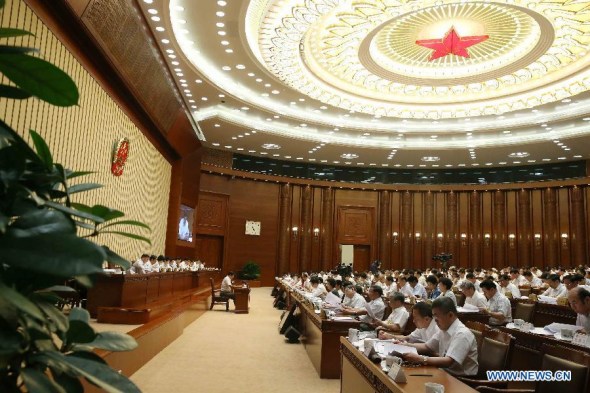

The 10th meeting of China's 12th National People's Congress (NPC) Standing Committee is held in Beijing, China, Aug. 25, 2014. Zhang Dejiang, chairman of the NPC Standing Committee, presided over the meeting. (Xinhua/Liu Weibing)
The Standing Committee of the National People's Congress (NPC), China's top legislature, opened its bi-monthly session on Monday with a dozen important bills under review.
The opening meeting of the seven-day session was presided over by Zhang Dejiang, chairman of the NPC Standing Committee.
Lawmakers started discussions with a report from Hong Kong Special Administrative Region (SAR) Chief Executive Leung Chun-ying on whether to revise election methods for Hong Kong SAR's chief executive in 2017 and its Legislative Council in 2016.
[China's NPC starts discussing HK electoral reform]
This is the second step for Hong Kong's electoral reform. Hong Kong plans to introduce universal suffrage in the election of chief executive in 2017.
Four bills were tabled for their first reading. They include the draft revisions to the Legislation Law, the Advertisement Law and the National Security Law.
[China considers renaming national security law 'counterespionage']
The bill on Legislation Law expands the number of Chinese cities having their legislative powers from 49 to 282.
The draft revision to the National Security Law suggests changing the law's title to the Counterespionage Law and adding more provisions on this line of work.
Lawmakers also read a bill regarding minor revisions to five laws facilitating the central government's ability to cancel or decentralize administrative approvals. It was the first time the bill had been reviewed.
In January, the State Council, or China's cabinet, canceled and decentralized a number of administrative approvals. Some of which cannot happen without revision of laws.
The bill suggests changing provisions for laws pertaining to insurance, securities, registered accountants, government purchase and meteorological services.
For instance, the bill removes a provision that asks actuaries to obtain a qualification from the government insurance regulator. It also authorizes provincial governments to punish those undermining the safety of meteorological facilities.
Three bills were submitted to lawmakers for additional readings. The draft amendment to the Budget Law was submitted for its fourth reading while the bill to revise the Workplace Safety Law and one to revise the Administrative Procedure Law were for the second reading.
Lawmakers also discussed two draft resolutions, one about setting September 30 as Martyrs' Day and the other to set up special courts for intellectual property rights in Beijing, Shanghai and Guangzhou.
Copyright ©1999-2018
Chinanews.com. All rights reserved.
Reproduction in whole or in part without permission is prohibited.